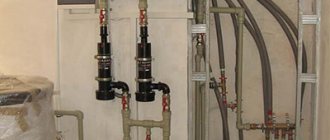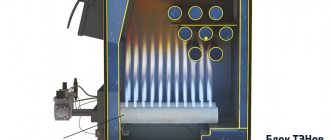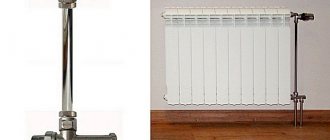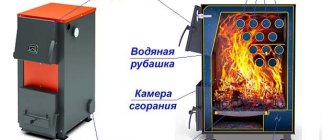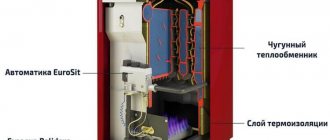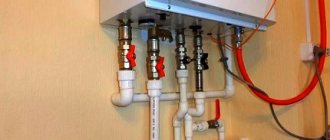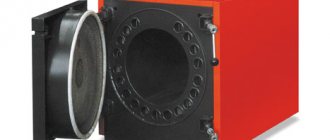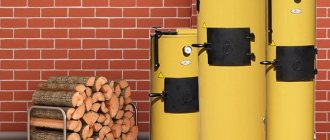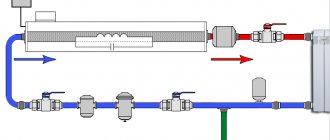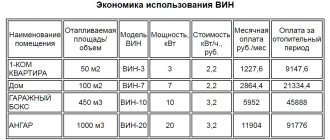Home / Electric boilers
Back
Published: 05/31/2019
Reading time: 3 min
1
6474
Using electricity for heating is a common way to heat a home. This method is environmentally friendly (no impact on the environment) and convenient.
The only factors limiting the spread of such heating are:
- Electricity tariffs and their growth in the future.
- Consumer expenses for supplying and connecting to housing the electrical power necessary to ensure comfort.
When the user decides on fuel for the boiler, he is limited in choice. There are no natural gas or district heating networks near his home, and there is no market for wood or agricultural waste.
Photo source: buildingwork.net
Then the electric boiler becomes the only alternative and the main source of heat. In bivalent heating systems it becomes a backup in combination with gas, solid/liquid fuel boilers or heat pumps.
- 1 Advantages and disadvantages of electric boilers
- 2 Electric boiler design
- 3 Operating principle 3.1 Boiler with heating element
- 3.2 Electrode boiler
- 3.3 Induction
General information
Electric heating boilers for private homes have been used for many years, but thanks to the development of microprocessor electronics, many current devices can be easily programmed to the desired operating mode for heating the living area. Modern electronic boilers are convenient because the operation of the heating system can be easily adjusted and electricity not wasted at a time when all residents leave the house, and when using a two-tariff meter, the device can be configured for maximum operation at night, when the cost of electricity is much lower.
Electric heating boilers Source ultra-term.ru
Purchase and operation: everything is learned by comparison ↑
Let's consider step by step all the costs that the purchase, installation and operation of an electric unit will cause you and compare this type of heating equipment with other offers on the construction market.
Electric or gas? ↑
The fact that gas is cheaper than electricity, as they say, is a no-brainer. If there is a gas main nearby the building (house), the choice becomes obvious. But remember that in addition to the cost of energy, there are many more aspects that need to be taken into account:
- cost of equipment - the “average” electric boiler is cheaper than its gas counterpart;
- installation cost - installation of electrical equipment will also cost much less;
- the electric device is structurally simpler and, unlike a gas device, does not require constant maintenance;
Electricity or liquid fuel? ↑
The cost of electrics, naturally, is slightly higher than the cost of liquid fuel. In the case of an electric boiler, you only need the boiler itself, while for a liquid fuel boiler you will also have to purchase additional “accessories”. As for installation, maintenance and design features, everything here is similar to a gas device.
Turning on the electric boiler
Electricity or solid fuel? ↑
Automatic operation and ease of maintaining the temperatures required for comfort are the main advantages of electric boilers over their solid fuel counterparts.
The combined use of an electric and solid fuel boiler is a fairly common “union”.
Features of using electric boilers
Electric boilers for heating a private home are convenient because their installation does not require installing a chimney to remove gases. Electrical installations are virtually silent and do not burn oxygen in the room.
The only disadvantage of such systems can be considered the possibility of electric shock and too high prices for consumed electricity. These shortcomings can be overcome if the equipment is installed taking into account safety regulations, and to save money, as mentioned above, a two-tariff electric meter is purchased.
With the right approach to using an electric boiler in a private home, such a system is not inferior to other types of heating installations, and in many respects significantly surpasses them.
Electric boiler with water heater in a private house Source sellprint.ru
Economical electric boiler for heating
The temperature regime of the boiler can be set by a programmer.
The use of electric boilers for heating, due to the constant increase in the cost of electricity, requires special attention to its consumption. Naturally, in the process of choosing a heating installation, in addition to power, you need to pay attention to its efficiency, i.e. With maximum performance, an electric boiler for heating a house should consume as little electricity as possible.
In order to reduce energy costs, you need to be able to adjust the temperature in the room. To do this, you need to choose an electric boiler with the possibility of stepwise power adjustment, which will allow you not to use the full power of the unit during periods when it is not needed.
Another good opportunity to obtain significant energy savings is to install additional devices in the home heating system, which make it possible to set the temperature in each room separately. These devices are called programmers. They are capable of automatically setting and maintaining a given temperature in the premises according to a schedule set by the owner of the house.
In addition to saving energy, devices such as programmers are also used to increase comfort in the home. If there are no people in the room, the programmer maintains the temperature at a minimum level, and at a time specified by the owner, turns on the equipment at the power required for high-quality heating of the house. The cost of such devices is not very high and pays off in a very short time, since their operation allows significant savings on energy consumption.
An excellent way to reduce energy consumption is to use a system that makes heating work dependent on the outside temperature. Some developers of electric boilers provide for the installation of such a system in advance.
Thus, if you take into account all the characteristics of an electric boiler, choose the right additional equipment and properly insulate the house, then using electrical equipment becomes not such an expensive pleasure.
The best posts
- Patterns of primitives. Doll with a bear
- Strengthening wooden floors - ways to strengthen the ceilings and beams of the second floor
- Jute filigree: patterns for beginners with photos and videos
- Wooden furniture from IKEA: what and how to paint it?
- How to hem the bottom of a curtain: features of fabric cutting
- Covers and stickers: new life for an old interior
- How to choose a carpet for a modern interior? (15 photos)
- Is it possible to glue wallpaper onto water-based paint: painting wallpaper, video, how to stick it, will it stick to water-based paint, photo
Boiler selection criteria
Currently, specialized stores sell electric heating boilers with many characteristics, and which ones are best for a private home can be very difficult to figure out. When choosing an electric boiler, you should first of all pay attention to the following criteria:
- power;
- type of heating element;
- manufacturer;
- availability of additional functions.
The power rating of the purchased device will determine whether the device can handle heating the living space of the house, and the type of heating element used in the boiler will determine its cost. The cheapest boilers are devices that use heating elements to heat the coolant, and the most expensive are induction units. Its price depends on how well promoted the boiler manufacturer is; in addition, the cost indicator will be influenced by the presence of additional functions of electrical equipment.
Electric heating system for a large country house Source stot64.ru
See also: Contacts of construction companies that offer house insulation services
Types and features
The following types of electric boilers are used to heat a private home:
- Heating element - a tubular electric heater is used to heat the coolant. Such boilers are inexpensive and not too demanding on the quality of the liquid. The main disadvantage of these heating devices is the formation of scale on the heating element, which may fail due to excessive heating.
- Induction devices are the most energy-efficient devices in terms of energy consumption, but the cost of such a device will be noticeably higher compared to a heating element boiler.
- Electrode is a type of electric boiler that is safe to use, but very demanding on the quality of coolants.
Any of the listed units can be used for installation in a private home, but with a large usable heating area, boilers that use heating elements are least suitable.
Types of boilers
In the Russian climate, it is impossible to live without heating your home in winter. But not all rural areas have access to centralized heating. Therefore, an autonomous heating source is required.
But it is unlikely that any of the townspeople will build a traditional Russian stove in a private, albeit small, house, with the help of which one can heat the room and cook food on it. Too exotic and labor-intensive heating option for our days.
Almost all people in this situation will prefer to install a heating boiler (OK). The industry offers a variety of types of heating installations. Boilers are classified according to the type of fuel used:
- gas;
- solid fuel;
- liquid fuel;
- electric.
In addition to them, combined or universal boilers are produced. They are called that because they can operate on two or more energy sources. For example, on gas and electricity or on wood and gas. The most advanced modifications can use liquid, solid, gaseous fuel and electricity.
What type of boiler should I choose for a private home? The choice depends on a number of parameters - room area, most available fuel, safety, ease of maintenance, price.
In particular, in a small house it does not make sense to install a powerful multi-fuel channel. It is expensive and requires a separate room. The costs will not be worth it. But in this case, an electric boiler is perfect.
In such a house you cannot do without an autonomous heat source
How to choose a boiler for a private home
An electric boiler must fully cope with the task of heating a private home, so the device must be selected correctly in terms of power. For an accurate calculation, it is necessary to calculate the heat loss of the building. With this question, it is better to contact specialists who will not only determine the location of heat leaks, but also make the necessary calculations of the power of heating equipment. In general, you should choose devices that are 20–30% more powerful than necessary to provide heat for the entire house.
Electric boilers with heating elements
Such devices are most often used as the main or additional heating of a room. Electric boilers with heating elements can be either wall-mounted or floor-mounted. Floor-standing units, as a rule, are designed for high power and have large dimensions.
Considering the high probability of failure of the heating element, some models are equipped with two heating elements. Such installations are more reliable and allow you to fully heat the premises even if one heating element fails.
New heating element electric boiler Source kotlof.ru
Induction electric heaters
An alternating magnetic field is used to heat the coolant in induction boilers. Under the influence of strong alternating magnetic fields, the metal heats up and heat is transferred to the liquid in the tank. Thus, it is possible to completely isolate the electric heating element from the effects of liquid and salts dissolved in it.
Induction boilers are much more expensive than heating elements, but given the high reliability, efficiency and high power of such heating systems, experts recommend choosing to purchase boilers of this type.
Vortex induction heater Source nn.kotel-t.ru
Principles for choosing an electric boiler
When purchasing a boiler, there are several other factors to consider. A very important parameter is the boiler power. For modern OK it varies from 2.5 kW to 60 kW. A weak boiler will not cope with providing heat to the room; an overly powerful one will lead to unreasonable expenditure of electricity and money.
The required power is calculated using a special formula. To find out the power, you will need to multiply the area of the room by the specific power (DP). The second indicator is set separately for each region. The figure obtained as a result of multiplication must be divided by 10. Let's say the house is located in the Moscow region, where the UD is 1.2 kW. The area of the house is 200 square meters.
Therefore, the electric boiler must have a power of at least 24 kW. However, the above formula is valid only for single-circuit models. If hot water supply is provided, the power must be increased by 20 percent.
Power adjustment deserves attention when choosing. It comes in two types:
- stepped;
- smooth.
The first type of regulation is used in devices with independent electric heaters. As a rule, with this adjustment option, the boiler can be operated at 25, 50, 75 and 100 percent of the designed power.
For smooth regulation, a rheostat is required.
In cheap units whose power is low, there is no possibility of regulation.
When purchasing an OK, rated for 380 volts, it is necessary to be able to connect a three-phase power line to the house.
You should look at how many circuits the OK is designed for. Electric boilers are usually not used to heat two circuits because they consume too much electricity.
Automation OK is important. It ensures the safe operation of the unit and allows you to rationally use electricity by regulating the temperature. It is practiced to install two types of thermostats:
- mechanical;
- electronic.
A mechanical type thermostat operates either on bellows filled with gas or liquid, or on bimetallic plates. When the temperature reaches the set value, the thermostat opens the electrical circuit. After the temperature drops below a certain level, the thermostat turns OK again. Mechanical automation is simple, resistant to voltage surges, but not sensitive enough. Deviations from the set temperature by two to three degrees are possible.
Electronic automation can control both the temperature of the room and the coolant. It is characterized by high sensitivity and accuracy in operation. The temperature can be changed using the control panel or by preset programs. The cost of such automation is higher than mechanical.
All electric boilers are compact in size. The smallest size is electrode OK. Their length can reach as long as centimeters. They can be mounted directly on a pipe with circulating coolant.
OK are sold in a basic configuration and with additional options (expansion tank, remote thermostat, etc.) They may or may not be needed. Before abandoning the purchase of additional devices, you should calculate the results of such a step. If you need to purchase them after purchasing the basic version of the electric boiler, it will cost more.
The efficiency of almost all modern models is at the level of 95-98 percent.
OK housings can be made of various materials (steel, copper, plastic, etc.). The material affects the strength of the body and fire safety.
The price of the unit is influenced by several factors:
- power;
- number of circuits;
- additional options;
- type OK;
- manufacturer.
For example, electric boilers from well-known European brands will, of course, cost more than Chinese or Russian ones. Heating element OKs cost less than electrode or induction ones.
Russian electric boiler "Zota"
Installation and operation of an electric boiler
You can install an electric heating boiler yourself. Depending on the type of unit purchased, the heating installation is mounted on the wall or on the floor. In both cases, installation is carried out in the following sequence:
- marking the location of the boiler;
- drilling mounting holes;
- installation of the boiler on anchor bolts;
- connecting the boiler to grounding;
- connecting the device to the heating system;
- connecting the device to the power supply;
- filling the heating system with coolant and removing air pockets;
- boiler startup.
Diagram for connecting an electric boiler to a heating system Source stroyfora.ru
If all of the above steps were performed correctly, the electric boiler will start and the heating system will begin to function normally. During operation of the boiler, it is necessary to monitor the coolant level in the tank. If it drops to a minimum, then add water to the normal value.
If leaks occur, to prevent the device from malfunctioning, it is necessary to immediately eliminate the depressurization of the system. Also, during operation, electric boilers for the home must be cleaned of dirt and the wiring connected to the device is in good condition.
Important! The installation and connection of an electric boiler should be done by professionals.
Electrode heating boilers
Electrode heating boilers are known to everyone from the sensational advertising of Galan boilers with their miniature sizes.
This is true, electrode heating boilers can be compared with instantaneous water heaters, only in them the water is heated due to the passage of current through the coolant. In these devices, the coolant itself heats itself. This is achieved by placing special electrodes in the coolant medium that excite the oscillations of free electrons of water, as a result the water heats up.
Electrode boilers are distinguished by:
- Cylindrical shapes;
- Small sizes;
- Cost-effectiveness when installing NOT cast iron radiators;
- Safety. They do not work in the absence of water;
- Automatic switching on/off based on temperature sensors.
Disadvantages of such boilers:
- You cannot adjust the power, only on/off;
- Scale formation, as a result, reduction in power;
- Water requires preparation;
- You cannot use traditional coolants antifreeze and antifreeze;
- Distilled water is not suitable for coolant;
- There is a possibility of direct current leakage to the housing and heating pipes;
- Electrolysis, which occurs during processes in an electrode boiler, leads to the formation of toxic gases and requires periodic replacement of the coolant.
Disadvantages of heating with electricity
The main disadvantage of using electric boilers for heating a private home is the high probability of a power outage. This usually occurs during natural disasters and power line failures. Such troubles arise especially often in the winter season, when the heating operation should not be interrupted for a long period of time.
Considering the large power consumption of such devices, it is almost impossible to provide backup power to the heating system using batteries. The problem can only be solved by connecting powerful generators, which are expensive and consume large amounts of gasoline or diesel fuel.
If you need to connect a powerful heating installation, then, as a rule, such boilers are powered from a three-phase electrical network. Therefore, if in a populated area it is not possible to connect a voltage of 380 V, then heating with electricity will be unavailable for a large private house.
An important disadvantage of using electricity is the high cost of electricity, which only increases every year.
Electrode boilers: main features
Electrode boilers have modifications for single-phase or three-phase networks.
Before choosing an electrode boiler, be sure to study its features and fundamental differences from other types of equipment. The main difference in this case is how the coolant is heated. The functions of the elements that heat the unit are performed by electrodes, which transfer the force of electrical energy to the thermal carrier, which is heated by its own resistance at the moment when an electric current passes through it. Using this method, water molecules can be split into ions, which are then directed towards the corresponding electrodes.
One cannot ignore the fact that the movement of ions does not in any way provoke the formation of scale on the electrodes, since the polarity of these elements is adjusted based on the frequency characteristic of this network.
Among the main advantages on the basis of which one can choose such equipment are such qualities as compactness, safety, low cost and gradual access to basic power.
Among the disadvantages that limit the choice of such equipment, it is necessary to note the mandatory water treatment. In addition, non-freezing liquids cannot be used here as a coolant. In addition, you need to maintain normal fluid circulation. If it decreases, the water in the boiler will simply begin to boil, and if it increases, the unit may not start.
Article on the topic: Gray wallpaper: photos in the interior, what color is suitable for walls with flowers, light laminate, white background, blue furniture, combined, sofa, video
Installation procedures
To hang the device, you need a mounting plate, which is included in the delivery package: it is attached to the wall with four dowels or anchor bolts with mandatory horizontal and vertical alignment. If this is a floor-standing boiler, then it is installed on a special stand.
The device must be grounded, inspected and made sure that it is in the correct position, the water pressure in the system is normal, and all communications are connected.
Electric heating units must be connected with a wire whose cross-section is indicated in the documentation for the equipment. Wires are carried in special protective boxes.
Scheme options
There are various diagrams: a diagram for connecting an electric boiler with heating radiators, diagrams with the possibility of installing a cascade. The latter option is used if it is necessary to heat large areas. To operate devices in a cascade, the terminals of the control unit are connected to the terminals of the controlled unit. If the installation system is controlled by a room regulator, then its control contacts are connected to the terminals of the leading equipment.
Heating apparatus piping
Tying can be carried out using a direct or mixing scheme. The direct scheme involves adjusting the temperatures with a burner, the mixing scheme involves a mixer with a servo drive. The binding is carried out as follows. The boiler manifold is installed, a pipe of the required diameter is connected to the boiler.
A three-way mixing valve is installed at the inlet, which will regulate the temperature. A circulation pump is installed on the return line and a control unit is mounted. After piping, you can fill the system with coolant and test the operation of the equipment for correctness.
Do not underestimate this stage: in reality, it is not as simple and insignificant as it might seem. Normal piping allows you to use equipment without an automation system, and this greatly reduces costs. Therefore, it must be performed at a professional level and taking into account the design features of the system and boiler.
The wiring of an electric boiler must be done by a specialist. If you still have to do it yourself, then you need already assembled distribution units. General diagram of the implementation of a heating system in a house.
Operating principle of electric boilers
Heating boiler wiring diagram.
An electric boiler can be connected anywhere, it works normally where there is power supply, it does not require purchasing and storing fuel or setting up a special room. It is enough just to connect to the electrical network and remove the pipeline. For many people, such boilers have become an indispensable assistant. Thanks to its compact size, the electrode boiler can be installed even in a very small room, while the modern design of the equipment will allow it to fit seamlessly into any interior. The basic package includes an expansion tank, a heating element, elements for regulating and controlling the operation of the heat generator.
The operating principle of the equipment is extremely simple: coolant is supplied to the expansion tank, which is heated by electricity and then distributed through radiators and pipes. Electric heating boilers are characterized by high efficiency, which often reaches 100%; ease of operation, affordable cost of units, silent operation, safety and environmental friendliness are also undeniable advantages of such heating equipment. Of course, in addition to the advantages, heating boilers powered by electricity also have certain disadvantages, which are largely associated with the domestic organization of the electrical system. It is imperative to remember about the cost of electricity, which is increasing all the time, about frequent interruptions in the supply of electricity, power surges, which negatively affect the functional part of the equipment and its service life.
Electric heating boilers are endowed with a stylish and modern design, ease of maintenance and stepwise power switching. The equipment can be connected in cascade to create a powerful installation. Electric boiler: advantages and disadvantages
Electric boiler design diagram.
Like any other equipment, an electric boiler has its advantages and disadvantages. Among the undeniable advantages, one can highlight, first of all, compactness. This equipment is really very compact and almost invisible in the overall design of the system. Such boilers are low in cost, have a smooth ramp up to rated power and, among other things, the peculiarity of their operation eliminates the possibility of an emergency in the event of a water leak. If water suddenly disappears from the system, the equipment simply will not work.
Among the disadvantages are the following points:
- the need for water treatment. The equipment will operate effectively only if certain values of water resistivity are ensured, which very often cannot be independently measured and brought into compliance with standards;
- ensuring optimal coolant circulation. If the circulation is weak, the water in the electric boiler may boil. If forced circulation is too fast, the equipment may not start;
- Non-freezing liquids cannot be used as a coolant.
Thus, having become familiar with the operating principle of an electric boiler, everyone will draw their own conclusions: whether to buy it or not.

